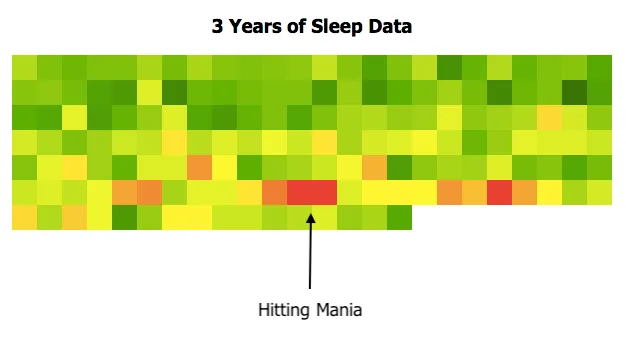A New Scientific Model of Mania and Depression, with Testable Predictions
by Breck Yunits
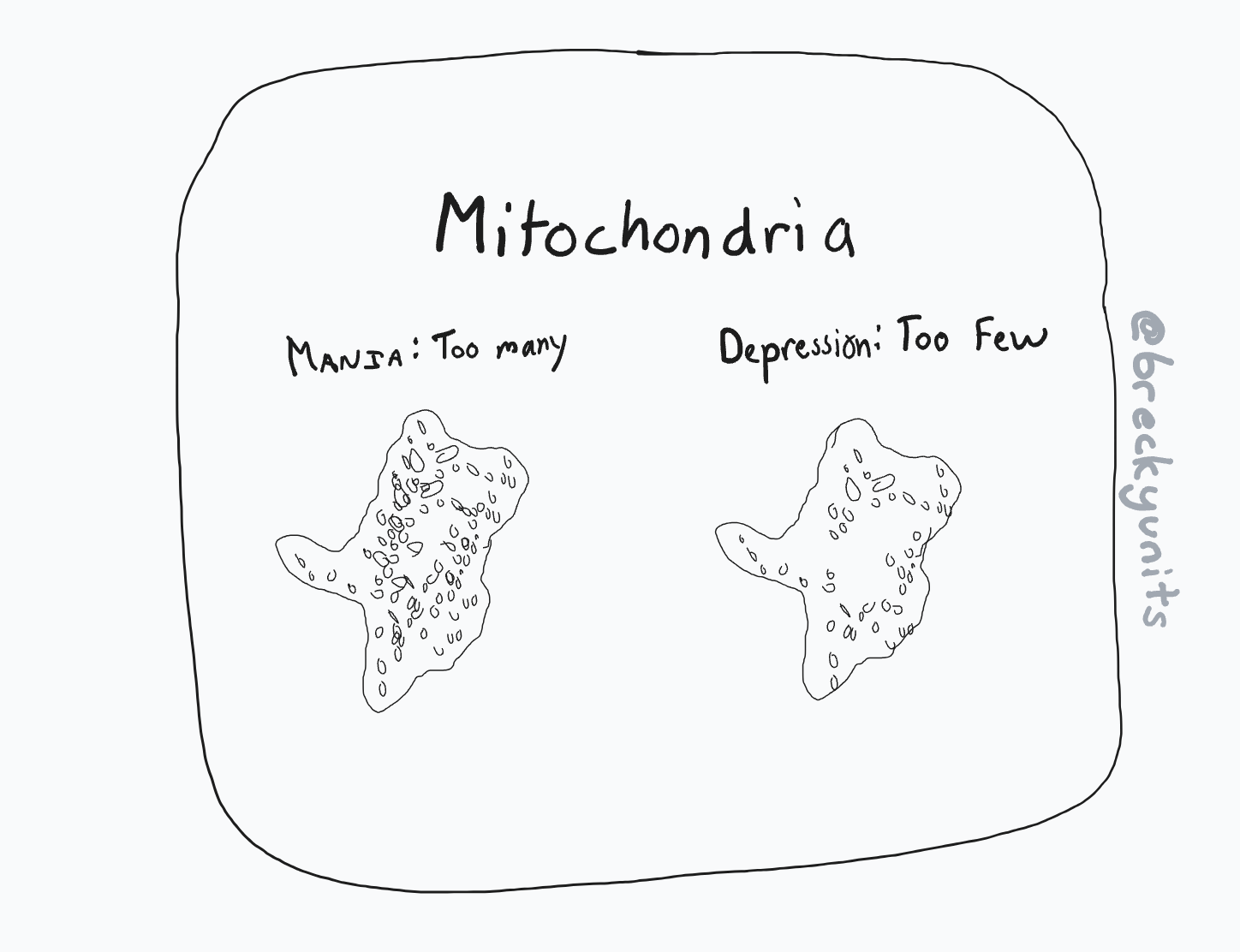
The model proposed here. Mania is too many mitochondria; depression too few. We predict it is possible to detect mood state from optical images of certain cells and counting stained mitochondria.
Is your liver on right now? You can find out with a drop of blood.
If your ketone levels are around 0.1, your liver is off.
If they are around 1,0, your liver is on.
It's easy to tell, once you've measured.
Continue reading...Naked bodies in Las Vegas
August 14, 2024 — I'm in Las Vegas for DEF CON and walking on the strip in 110 degree heat when a guy in dark clothes asks if I want to see some nude girls.
"Wait, how did you know I'm an amateur biologist?" I ask.
He frumps his brow and starts talking to a different group of guys.
Continue reading...by Breck Yunits
Just as I sat down for my first meal in Nepal, the power went out.
Continue reading...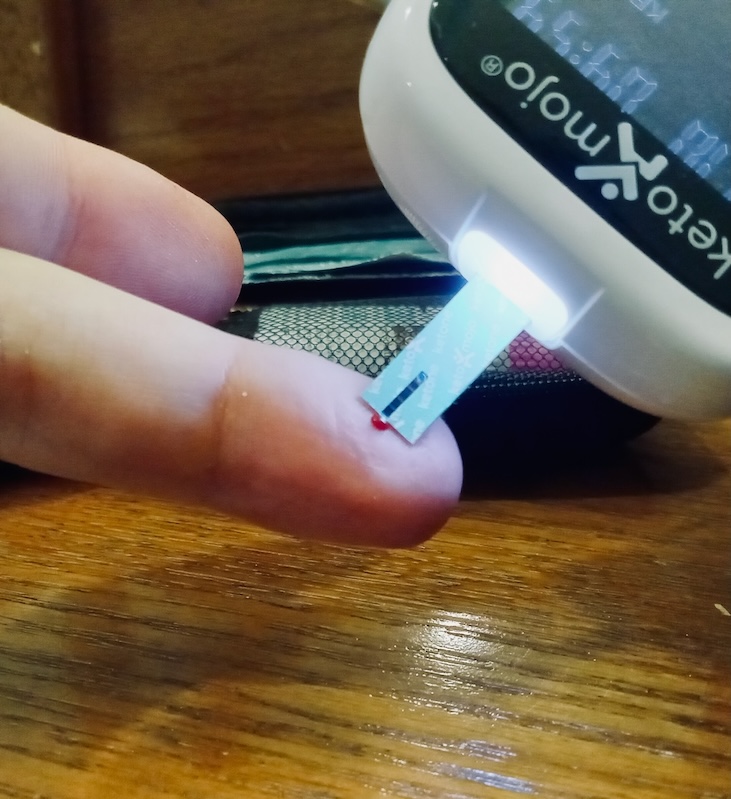
Pricking my finger then measuring the level of ketones in my blood.
April 16, 2024 — I pricked my finger and moved a disposable ketone measuring stick into the newly formed drop of blood. I was checking my "blood ketone" levels. If the result came back higher than 0.8 mmol/L, I would be in a state of "ketosis".
The meter showed "1.0 mmol/L". Success! I was still in ketosis.
Continue reading...April 10, 2024 — Now that I am writing more about Bipolar Disorder, and even have a category page for the term, I thought I should write a brief note on what I think about the term itself.
In short, I predict in the long run, as our understanding increases, the phrase "Bipolar Disorder" and its sub-phrases (Bipolar I, Bipolar II, Bipolar NOS, and Cyclothymia), will fall out of use and be replaced by a larger set of more specific terms clustered not by symptoms but by biological causes.
Continue reading...April 5, 2024 — Have you ever examined the correlation between your writing behavior and sleep?
I've written some things in my life that make me cringe. I might cringe because I see some past writing was naive, mistaken, locked-in, overconfident, unkind, insensitive, aggressive, or grandiose.
I now have a pretty big dataset to identify my secret trick to write more cringe: less sleep.
For this post I combined 2,500 nights of sleep data with 58 blog posts. A 7 year experiment to see how sleep affects my writing.

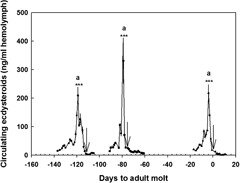
In lobsters, a steroid hormone called ecdysteroid spikes during the pre-molt phase and declines sharply after molting. Source: J. Sook Chung
April 3, 2024 — I just saw Dune 2 at the theater, but far more noteworthy is this YouTube of a lobster molting. I can confidently claim that before that video I had never spent a minute of my life thinking about lobsters molting. To be honest, if you had asked me last year if lobsters molt I probably would have said "No". But, I mean, watch the video (variable speed is fine). What a fascinating slash beautiful slash disgusting slash painful slash magical slash moving thing to watch. Can you imagine going through something like that over and over again in your life? I guess humans should be thankful for our endoskeletons.
Continue reading...March 8, 2024 — What is open-mindedness, from first principles? Here are some musings.
Continue reading...February 24, 2024 — In the near future AI will be able to generate an extensive list and rating of all of the skills in someone's brain.

The ugly prototype I made at a hackathon in 2023 to explore this idea.
February 20, 2024 — A lot of people, including me, are excited about an ambitious new research effort to see if bipolar disorder is best modeled as a mitochondrial disorder. I've started writing about it, and expect to write more about it in the future. But that's not what I'm writing about today.
Today I want to explore a model of bipolar disorder that I've wondered about for a few years, after reading about Marvin Minsky's "Society of Mind" model of the brain. In the model I explore today, mania and depression are not the result of a chemical imbalance, nor the result of a metabolic disorder, but instead are two neural circuits that are learned over time and persist in the brain, whether active or not, like learned skills. This post explores the brain pilot model of bipolar disorder.
Continue reading...February 9, 2024 — It is estimated 2% of the population is bipolar. Sunday I explored: what if that was 98%? And today I explore, why isn't it 0%?
Why does a condition that is 60-80% heritable, deemed a severe, chronic disorder, persist in society? Is this a case purely of selfish genes manipulating their host to reproduce? Is it a case of society changing in a way that previously useful traits are now harmful? Is it the case that society preserves bipolar genes because it can actually be a positive condition, hyperthymia, and there is a conspiracy to restrict that information for competitive reasons? Is it simply inevitable that any variable attribute will have outliers, and we are sure to have 2% mood outliers as we are to have 2% height outliers? Or is it the case that bipolars play a unique positive role in society and societies that have a small percentage of them do better than societies that don't?
Continue reading...February 4, 2024 — In our universe, an estimated 2% of humans have bipolar disorder. Imagine a universe where that ratio is flipped.
Continue reading...February 3, 2024 — Approximately every eighteen months, I start transitioning from a low energy person to a high energy person. No substances or triggering events are at fault. It is a natural cycle, as inevitable as the tides.
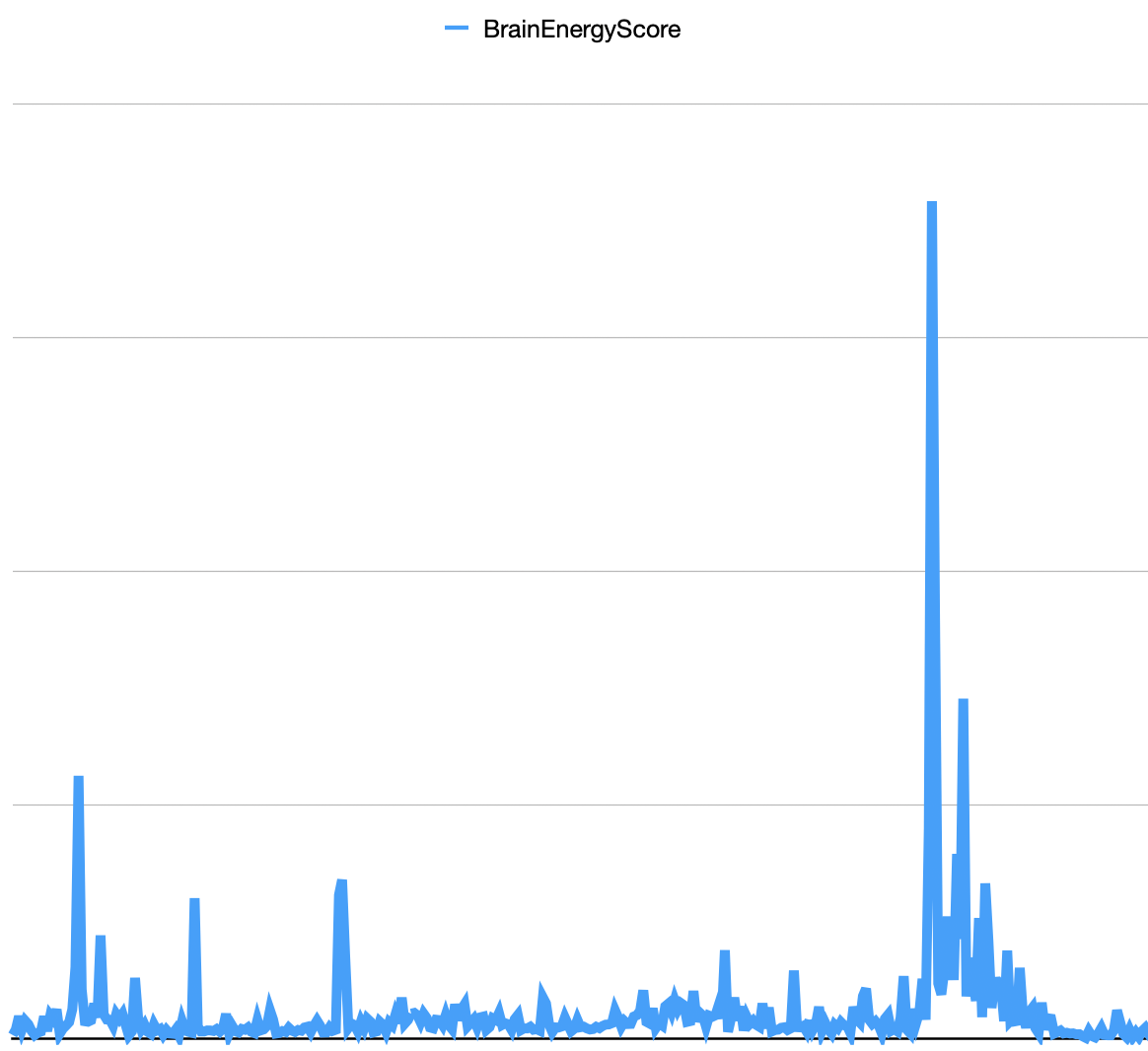
Your lifetime odds of getting hit by lightning are 1 in 15,000. Your lifetime odds of getting hit by a manic brain energy surge, like the one I was hit by here in 2022, are ~1 in 100. Like lightning strikes, brain energy surges can differ by orders of magnitude. You might just feel a slight shock, or you might become a very, very high energy person--temporarily. If you get hit by one large surge, you are likely to get hit again.
January 29, 2024 — This is a post about delusions. In society and in myself.
Continue reading...January 24, 2024 — Assuming I keep blogging, which I hope I manage to do, I expect my posts will largely be about bipolar disorder. I've been blogging for fifteen years but never wrote publicly about bipolar disorder, even though I was diagnosed twenty years ago. I kept my diagnosis a secret.
Bipolar disorder is a condition not yet understood, with no cure, and is predictive of disruptive behavior. So I very much understand why society discriminates against those with the label.
I did not keep my diagnosis a secret maliciously, but genuinely remained unsure how to handle it, and ultimately, optimistically, believed I would figure the thing out. But—like a Greek tragedy—my efforts to avoid my fate perhaps led me faster to it. My mania in 2022 was at least twice as strong as anything I ever experienced. Things went KABOOM!
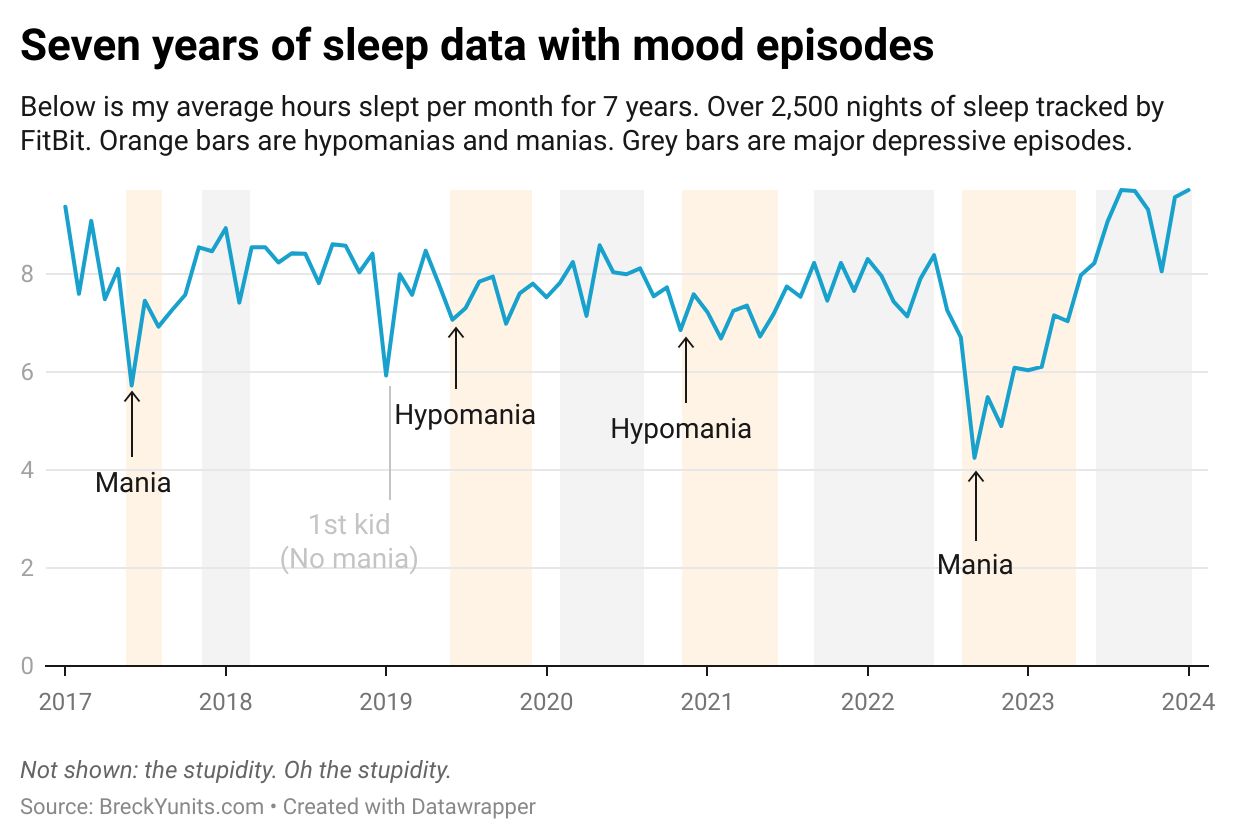
The past 7 years of mood swings, revealed accurately by sleep data. That sleep line nosediving in 2022 was bad. Real bad. HTML Version.
January 23, 2024 — I started a ketogenic diet as a treatment for bipolar disorder 97 days ago, on October 19th, 2023, after learning about it on YouTube from MetabolicMind and Bipolarcast. So far, it seems promising.
But I was perplexed: after 20 years of reading about Bipolar Disorder, and eight health care providers, how had I not heard of keto as a treatment option before? Had I missed it in all the materials I had read?
Continue reading...June 27, 2023 — I am so disappointed in myself for having yet another manic cycle and hurting the people I love. I'm sharing this to come out publicly as having bipolar disorder, take 80% blame for my actions and words, and maybe help someone avoid my mistakes.
Last August my brain lit up like fireworks. It felt like a cosmic river of energy suddenly detoured through my veins.
My FitBit data shows a seismic event:

In two weeks my heart rate rose 33% and my sleep fell to 2 hours per night.
May 9, 2023 — If you want to understand the mind, start with Marvin Minsky. There are many people that claim to be experts on the brain, but I've found nearly all of them are unfamiliar with Minsky and his work. This would be like a biologist being unfamiliar with Charles Darwin.
Continue reading...